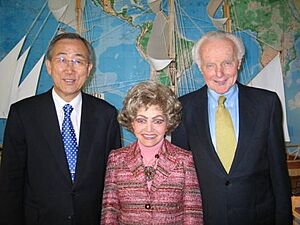Tom Lantos facts for kids
Quick facts for kids
Tom Lantos
|
|
|---|---|
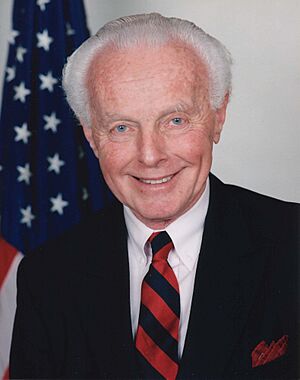 |
|
| Chair of the House Foreign Affairs Committee | |
| In office January 3, 2007 – February 11, 2008 |
|
| Preceded by | Henry Hyde |
| Succeeded by | Howard Berman |
| Member of the U.S. House of Representatives from California |
|
| In office January 3, 1981 – February 11, 2008 |
|
| Preceded by | William Royer |
| Succeeded by | Jackie Speier |
| Constituency | 11th district (1981–1993) 12th district (1993–2008) |
| Personal details | |
| Born |
Tamás Péter Lantos
February 1, 1928 Budapest, Kingdom of Hungary |
| Died | February 11, 2008 (aged 80) Bethesda, Maryland, U.S. |
| Political party | Democratic |
| Spouse |
Annette Tillemann
(m. 1950) |
| Children | 2 daughters, including Katrina Swett |
| Relatives | Tomicah Tillemann (grandson) Levi Tillemann (grandson) Charity Tillemann-Dick (granddaughter) |
| Education | Eötvös Loránd University University of Washington, Seattle (BA, MA) University of California, Berkeley (PhD) |
Thomas Peter Lantos (born Tamás Péter Lantos; February 1, 1928 – February 11, 2008) was an American politician. He was born in Hungary and later moved to the United States. He served as a U.S. representative for California from 1981 until he passed away in 2008. He was a member of the Democratic Party.
Lantos was the only Holocaust survivor to serve in the United States Congress. He survived the terrible events of the genocide with help from Raoul Wallenberg, a Swedish diplomat. He was known for fighting for human rights around the world. After his death, the Congressional Human Rights Caucus, which he started, was renamed the Tom Lantos Human Rights Commission to continue his work.
Contents
Early Life and Education
Tom Lantos was born in Budapest, Hungary, on February 1, 1928. His birth name was Tamás Péter Lantos. His mother was an English teacher and his father was a banker. His family cared a lot about education.
Surviving World War II
When Lantos was ten, he saw a newspaper headline that said "Hitler Marches into Austria." He knew this was a big deal for Hungarian Jews, including his family.
In March 1944, when Lantos was 16, German soldiers took over Hungary. Because he was Jewish, he was arrested and sent to a labor camp. He escaped, but was caught and sent back. He escaped again and went back to Budapest. There, he hid in a safe house created by Raoul Wallenberg, a Swedish diplomat.
Lantos helped Wallenberg's network. He had fair hair and blue eyes, which made him look "Aryan" to the Nazis. This allowed him to deliver food and medicine to other Jews in hiding. In January 1945, Soviet forces freed Hungary. But Lantos, then 17, learned that his mother and other family members had been killed by the Germans. About 440,000 other Hungarian Jews also died during this time. Wallenberg saved thousands of other Hungarian Jews.
Lantos shared some of his experiences in the movie The Last Days (1998). He often spoke in Congress about fighting against fascism. In 1981, he helped make Wallenberg an Honorary Citizen of the United States.
His Education Journey
In 1946, Lantos started studying at the University of Budapest. He wrote an essay about Franklin D. Roosevelt in English, which he spoke very well. This helped him get a scholarship to study in the United States.
He moved to the U.S. and studied economics at the University of Washington in Seattle. He earned his first degree in 1949 and a master's degree in 1950. He then went to the University of California, Berkeley, where he earned a PhD in economics in 1953.
Starting His Career
After finishing his studies, Lantos became an economics professor at San Francisco State University. He also worked as a business consultant and a TV commentator on foreign policy. Later, he became an advisor to U.S. Senators. In 1980, he was elected to the U.S. Congress. He served there until he died in 2008. He often said how thankful he was to the United States for the opportunities it gave him.
Family Life
Tom Lantos kept his Hungarian accent even after becoming fluent in English. He met his future wife, Annette Tillemann, when they were children. Her family escaped to Switzerland using Swedish passports from Raoul Wallenberg. After Hungary was freed, they met again in Budapest. They married in the United States on July 13, 1950, and were together until his death in 2008.
Lantos and Annette had two daughters, Annette Marie and Katrina Swett. They also had 18 grandchildren. Some of his grandchildren include Levi Tillemann, an author, and Charity Sunshine Tillemann-Dick, an opera singer. His daughter Katrina is married to Richard Swett, a former U.S. Representative. Lantos considered himself a secular Jew.
Political Career and Beliefs
Lantos first ran for office in 1980. He won against Republican Congressman Bill Royer. Lantos was re-elected 13 times and became known for defending human rights. For example, he pushed for Yahoo CEO Jerry Yang to testify in Congress. This was after Yahoo gave email records of Chinese activists to the Chinese government, which led to one being jailed.

Lantos was part of the Congressional Progressive Caucus. He often called for changes to the nation's health-care system. He also wanted to reduce the national debt. He supported same-sex marriage rights and was a strong supporter of gun control.
He also cared deeply about the environment. He worked to protect open spaces, which led to thousands of acres being protected in the Golden Gate National Recreation Area. This helps keep natural areas safe from building.
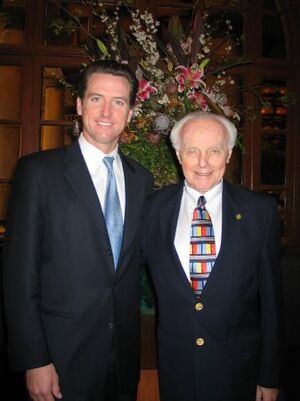
Lantos supported the Iraq War at first. But from 2006 on, he became critical of how the war was handled. He called for a diplomatic approach to end the fighting.
Focus on Foreign Affairs
Tom Lantos was the chairman of the United States House Committee on Foreign Affairs. He also co-chaired the Congressional Human Rights Caucus for over 20 years. This group worked on many human rights issues. They spoke up for Christians in Saudi Arabia and Sudan to practice their faith. They also helped Tibetans keep their culture and religion.
Lantos believed that the mass killings of Armenians during World War I were genocide. He supported democracy in Burma and wanted sanctions on Iran for supporting terrorism. In 2004, he sponsored a bill to stop the spread of antisemitism.
He also spoke out against wasted money in the U.S. reconstruction program in Iraq. He warned that the U.S. could lose Afghanistan to the Taliban if the Bush administration did not act quickly. Lantos was against U.S. military aid to Egypt. This was because Egypt had not stopped money and weapons from reaching Hamas in Gaza.
The 1991 Gulf War
Lantos strongly supported the 1991 Persian Gulf War. Before the war, in 1990, his Human Rights Caucus heard from a 15-year-old Kuwaiti girl. She was called "Nurse Nayirah" and told a story about Iraqi soldiers hurting babies in a hospital. This story was used to build support for the war.
Later, it was found that "Nurse Nayirah" was the daughter of Kuwait's ambassador to the U.S. Her story was questioned by human rights groups. Investigators found that most incubators were still in the hospital, and the number of babies killed was much lower than first claimed. Lantos said he had no reason to believe her story was false, and that many other human rights violations were happening anyway.
Views on the War in Iraq
On October 4, 2002, Lantos helped pass a resolution to use force in Iraq. This was approved by the United Nations. He said that President George W. Bush needed to let UN weapons inspectors finish their work. He also said Bush would need Congress's approval for a full declaration of war before invading Iraq. The resolution passed both the House and Senate.
However, starting in early 2006, Lantos began to disagree with the Bush Administration's policy in Iraq. He made critical statements about how the war was being fought. He praised investigations that found waste and fraud in the money sent to rebuild Iraq. Lantos was also against sending more troops to Iraq. In January 2007, when President Bush announced his plan to send more troops, Lantos said, "Our efforts in Iraq are a mess, and throwing in more troops will not improve it."
In September 2007, Lantos spoke during a hearing with General David Petraeus and Ambassador Ryan Crocker. He said, "The Administration's myopic policies in Iraq have created a fiasco." He added that Americans had little trust in the administration about Iraq. He also compared U.S. actions in Iraq to supporting Islamic fighters in Afghanistan decades earlier, which led to the rise of the Taliban.
A Champion for Human Rights
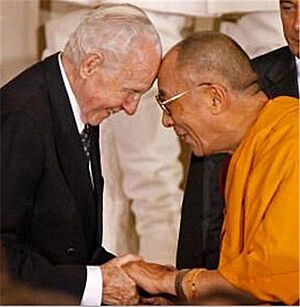
As a co-founder of the Congressional Human Rights Caucus and chairman of the Foreign Affairs Committee, Lantos worked to "stir the consciousness of world leaders and the public alike." According to Representative Nancy Pelosi, "Wherever there was injustice or oppression, he used his expertise and moral authority to put the United States on the side of justice and human rights." In 2007, he gave the 14th Dalai Lama the Congressional Gold Medal to help the people of China and Tibet.
Helping in Darfur
On April 28, 2006, Lantos and other U.S. Representatives protested in front of the Sudanese embassy in Washington, D.C.. They were speaking out against the Sudanese government's role in the genocide in the Darfur conflict. They were arrested for their peaceful protest.
Supporting Hungarian Minorities
Lantos also worked for the rights of Hungarian minorities. In 2007, he wrote a letter to the Prime Minister of Slovakia. He asked him to treat members of the Hungarian minority fairly.
The American Hungarian Federation honored Congressman Lantos for his "Leadership in Support of Democracy, Human Rights and Minority Rights in Central and Eastern Europe."
Lebanon and Syria
On August 27, 2006, Lantos said he would block money promised by President George W. Bush to Lebanon. He said this unless Lebanon agreed to have international troops on its border with Syria. This was to stop weapons from being smuggled to Hezbollah fighters.
Morocco and Western Sahara
Lantos supported Morocco's claim to control Western Sahara. He criticized the Polisario Front, which wanted the region to be independent. In 2007, he supported Morocco's idea to make the region self-governing under Moroccan rule.
Death and Lasting Impact
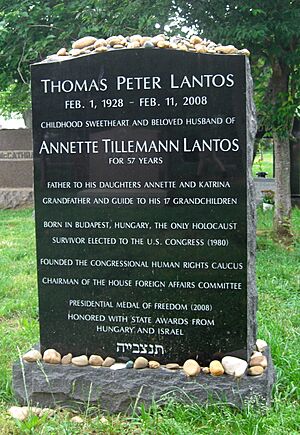
On January 2, 2008, Tom Lantos announced he would not run for re-election. He had been diagnosed with esophageal cancer. He said, "It is only in the United States that a penniless survivor of the Holocaust and a fighter in the anti-Nazi underground could have received an education, raised a family, and had the privilege of serving the last three decades of his life as a Member of Congress."
Lantos passed away on February 11, 2008, at the age of 80. Many politicians spoke about him. President George W. Bush called Lantos "a man of character and a champion of human rights." A memorial service was held for him at the Capitol. Speakers included Senator Joe Biden, Bono from U2, and UN Secretary-General Ban Ki-moon. He was buried in Congressional Cemetery in Washington, D.C..
A special election was held to fill his seat, and Jackie Speier won. Lantos had supported her.
On June 19, 2008, President Bush gave Lantos the Medal of Freedom after his death. This is a very high honor. Bush said, "We miss his vigorous defense of human rights and his powerful witness for the cause of human freedom."
In 2008, the Congressional Human Rights Caucus was renamed The Tom Lantos Human Rights Commission. Its goal is to "promote, defend and advocate internationally recognized human rights." The first Lantos Human Rights Prize was given to the 14th Dalai Lama in 2009. In 2011, the Tom Lantos Institute was created in Budapest to promote tolerance and support minority issues around the world.
Before he died, Lantos asked for a non-profit organization to be started to continue his work. The Lantos Foundation for Human Rights & Justice was founded later that year. His daughter, Katrina Lantos Swett, is its president.
In 2011, the Peninsula Humane Society & SPCA opened the Tom and Annette Lantos Center for Compassion in Burlingame, California. This animal shelter was named in their honor.
- The Tom Lantos Tunnels south of San Francisco are named after him.
- A street in Netanya, Israel, is also named after him.
- A youth group chapter in Rockville, Maryland, is named Lantos AZA #2539 to honor his legacy.
In 2016, Budapest named a promenade in the city after Lantos. He also received the Grand Cross, which is Hungary's highest civilian honor.
See also
 In Spanish: Tom Lantos para niños
In Spanish: Tom Lantos para niños
 | Shirley Ann Jackson |
 | Garett Morgan |
 | J. Ernest Wilkins Jr. |
 | Elijah McCoy |


